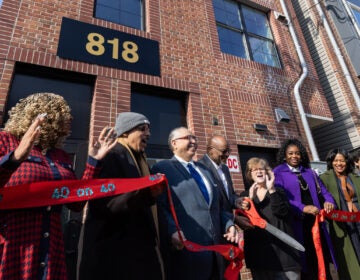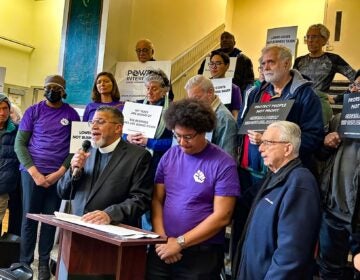‘Just cause’ eviction bill clears City Council committee
On Tuesday, a bill intended to protect renters from being evicted without “good cause” moved one step closer to a vote by City Council.

Councilman Curtis Jones (Tom MacDonald/WHYY)
On Tuesday, a bill intended to protect renters from being evicted without “good cause” moved one step closer to a vote by City Council. Passed out of committee, the bill will now go to the full council for consideration.
Introduced by City Councilman Curtis Jones, the bill’s progression marks another notch in the belt of fair housing advocates who have made reducing Philadelphia’s high rates of eviction a policy priority over the last year. Tuesday’s council vote came two weeks after the city announced a slate of new and improved city-funded programs designed to increase legal support for renters in danger of losing their homes.
A packed hearing room cheered Jones on at Tuesday’s council meeting as the Councilman, who represents a swath of the city that includes Manayunk, East Falls, Overbrook, Wynnfield and parts of West Philadelphia, relayed stories of an eviction he endured as an unemployed newlywed in the early 1980s.
“I cannot tell you the stress that housing insecurity put on us,” said Jones. “Now inner-cities have been discovered. Now people look at our housing stock and say, with a little investment we could make a lot of profit and damn the people. Everyone isn’t like that, but [this bill] is for those who are.”
Jones’ bill defines “good cause” as non-payment of rent, property destruction, or not conforming to the terms of the lease. It would also require that landlords give 30-to-60 days notice — depending on the length of tenancy — before eviction or a substantial change to the lease, even if there is “good cause” for such an action. The bill carries the potential for significant impact — between 2010 and 2015, one in every 14 renters in the city was served with an eviction filing, according to a 2017 report by Reinvestment Fund.
Of the council representatives in attendance, Republican David Oh offered the lone voice of opposition. He said that he feared additional rental protections could dissuade property owners in low-income neighborhoods from entering the rental market, potentially hurting rental supply in neighborhoods that need affordable units. (Opponents of “just cause” bills in other cities often argue that they disproportionately hurts mom-and-pop landlords.)
Landlord trade associations also oppose Jones’ bill, but no groups testified live, with only the Greater Philadelphia Association of Realtors submitting written testimony. The group denounced the legislation as an attack on property and Constitutional rights.
Although tenant advocates in the chambers disrupted the hearing to chant about “stopping gentrification,” the bill would have little effect on those who stand to lose their homes due to dramatic jumps in rent. If a landlord wants to raise the rent at the end of a lease, their legal obligation extends no further than offering the tenant the option to accept or reject the new rate. If the tenant does not agree, then the landlord does not have to renew the lease. Other cities, especially on the West Coast, have paired “just cause” bills with rent control or other forms of rent stabilization, a policy measure Jones does not support.
“I’m not interested in rent control,” he said. “I don’t want to be New York.”
The bill does, however, give tenants more warning to prepare for such a spike in housing costs, and offers protection against landlords who throw out otherwise stable tenants with no notice as retaliation for complaints, because of personal animus, or for no particular reason at all.
Despite his unfavorable opinion of rent controls, Jone framed the bill as a bulwark against gentrification. He repeatedly stated that it is a necessary precaution against any mass disruption to the housing market, perhaps by, say, an influx of tens of thousands of well-paid Amazon employees.
“I was the last elected official in the region to sign on to that Amazon support letter,” said Jones. “When 50,000 people making over $100,000 come to our city that’s a great thing, but what it would do to rental prices in Philadelphia would have catastrophic impact.”
The bill has undergone some revision since Jones first introduced last year and more changes are likely. Councilmembers Cindy Bass and Allan Domb both stated that they wanted to see further amendment.
Domb, who is a real estate developer, said he felt the current language in the bill is too broad, making it hard for people to sell investment properties. Domb also expressed concern that one caveat in the bill—which allows landlords to evict a tenant quickly or not renew a lease if they or an immediate family member need to move in—should be extended to include extended family as well. (Many such anti-eviction laws usually contain provisions that include the sale of a building or family moving in as a “just cause.”)
“I lease a property to my niece, because my brother passed away when he was 44,” said Domb. “Under this bill, I cannot terminate a tenant’s lease so she could move in because she isn’t my immediate family. I just want to make sure we don’t hurt anyone and that we cover all our bases.”
The Philadelphia Tenants Union has been a primary driver behind the bill. The organization’s campaign directors, Jarrett Smith and Margaret Nersten, reeled off a litany of statistics to support the case for the legislation. They focused on the toll of evictions in the eighth district, represented by Committee on Law and Government member Cindy Bass, whose constituents face one of the highest eviction rates in the city. Already this year there have been 54 eviction filings in her district alone.
“Tenants are routinely forced to leave and, if they try to complain without ‘good cause’ protections, they’re served with an eviction,” said Smith. The tenant union representatives said that in some of Philadelphia’s poorest neighborhoods, 15 percent of renters could face eviction every year. While those numbers are staggering, the “good cause” bill would not necessarily help them. As Harvard sociologist Matthew Desmond noted last year, there is a “good cause”—as defined by the bill—to evict most people who lose their homes: They do not have the money to pay their rent.
It is not clear that the bill would either be as damaging to landlord groups or as helpful to tenant groups as the rhetoric from either side would suggest.
“The strongest thing a just cause eviction law can do is to give people more notice, more time,” says Rasheedah Phillips, managing director of Community Legal Services’ housing unit. “No one is well served when you are rushing to evict someone when someone winds up homeless because they don’t have time to find an alternative. Time is one of the best resources we can give people, especially low-income people who don’t often have the luxury of time to find options that are good for them.”
WHYY is your source for fact-based, in-depth journalism and information. As a nonprofit organization, we rely on financial support from readers like you. Please give today.







